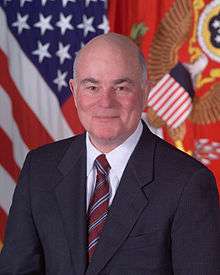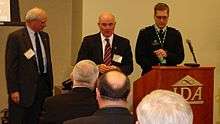Francis J. Harvey
Francis Joseph Harvey (born July 8, 1943) served as the 19th Secretary of the United States Army from November 19, 2004 to March 9, 2007.
Francis Harvey | |
|---|---|
 | |
| 19th United States Secretary of the Army | |
| In office November 19, 2004 – March 9, 2007 | |
| President | George W. Bush |
| Preceded by | Les Brownlee (Acting) Thomas E. White |
| Succeeded by | Pete Geren |
| Personal details | |
| Born | Francis Joseph Harvey July 8, 1943 Latrobe, Pennsylvania, U.S. |
| Political party | Republican |
| Education | University of Notre Dame (BS) University of Pennsylvania (MS, PhD) |
Education and family
Harvey was born and raised in Latrobe, Pennsylvania. He earned his doctorate in Metallurgy and Materials Science from the University of Pennsylvania and his Bachelor of Science at the University of Notre Dame in Metallurgical Engineering and Materials Science. As of 2013, he and his wife of 52 years, Mary, have two boys. They also have five grandchildren.[1]
Career
The majority of Harvey's career was spent with corporations that provided products and services to the federal government, particularly the United States Department of Defense, and included a year of government service. He was involved in over 20 major defense programs across the entire spectrum from undersea to outer space, including tanks, missiles, submarines, surface ships, aircraft and satellites. In addition, he was a member of the Army Science Board in the late 1990s, traveling to numerous U.S. Army installations, and participated in early studies that helped define the Future Combat System. Harvey also served for one year as a White House Fellow and assistant in the immediate office of the Secretary of Defense, Harold Brown, in the late 1970s.
Harvey held various professional, management and executive positions within the Westinghouse Corporation from 1969 to 1997, including President of the Electronics Systems Group, President of the Government and Environmental Services Company, and Chief Operating Officer of the multibillion-dollar Industries and Technology Group. Before his appointment as Army Secretary, he was also a Director and Vice Chairman of Duratek a portfolio company of the Carlyle Group specializing in treating radioactive, hazardous, and other wastes, He was also Director and Vice Chairman of another Carlyle Group portfolio company, The IT Group, which provided environmental services to both commercial and military customers. In addition, he was a member of the boards of several other corporations.
Secretary of the Army

Harvey was nominated to be Secretary of the United States Army on September 15, 2004 by President George W. Bush.[2] In this position, Harvey served as the senior civilian official within the Department of the Army. He was responsible for all matters relating to Army manpower, personnel, reserve affairs, installations, environmental issues, weapons systems and equipment acquisition, communications, and financial management, as well as an annual budget of $98.5 billion and over one million soldiers, personnel, and contractors.[3]
Walter Reed incident and resignation
In the wake of the Walter Reed Army Medical Center neglect scandal, Harvey announced his resignation on March 2, 2007 after being asked to do so by Secretary of Defense Robert Gates,[4] with effect from March 9.[5] In his memoirs, Gates cited Harvey's appointment of Army Surgeon-General Kevin C. Kiley as temporary hospital commander. This appointment "was greeted with dismay by many wounded warriors and their families" because many of these problems arose during Kiley's previous command of the hospital.
Gates described Harvey as "a good man who had rendered distinguished service to the country. I fired him because once informed of the circumstances at Walter Reed, he did not take the problem serious enough".[6]
There is an alternative explanation of why Harvey was asked to resign as outlined in the book Leadership Lessons of the White House Fellows by Charles P. Garcia (McGraw Hill, 2009). In the preface of the book, it states that "he was abruptly forced to resign allegedly for his handling of incidents at the Walter Reed Medical Center, but in reality, it was for standing firm on the Army Budget."
References
- Associated Press (March 2, 2007). Biographical Info on Francis J. Harvey.
- Personnel Announcement
- DefenseLINK - Page Not Found (404)
- Lawmakers vow action on Walter Reed - Military - nbcnews.com
- Secretary Harvey Says Farewell
- Gates, Robert (2014). Duty: Memoirs of a Secretary at War. Alfred A Knopf. p. 112. ISBN 978-0-307-95947-8.
- Garcia, Charles P. Leadership Lessons of the White House Fellows: Learn How to Inspire Others, Achieve Greatness, and Find Success in Any Organization. New York: McGraw-Hill, 2009. ISBN 0071598480
External links
| Wikimedia Commons has media related to Francis J. Harvey. |
| Government offices | ||
|---|---|---|
| Preceded by Les Brownlee (Acting) |
United States Secretary of the Army November 19, 2004 – March 9, 2007 |
Succeeded by Pete Geren |

